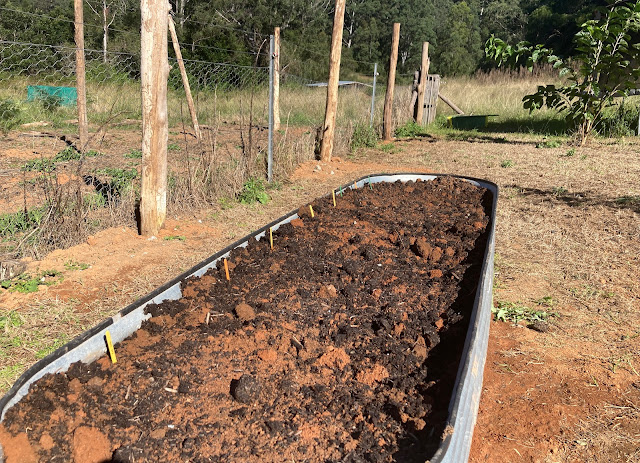The mountains we live in create a funny climate. Technically we live in the subtropics, and as such our summers are long, hot, wet and humid. The valley we live in is surrounded by tall hills, which creates a microclimate that on one hand gives us protection from strong winds, but on the other hand, it means we struggle with moulds and mildew in the hot summer months.
Turning these raised beds into a kind of hugelkulter beds.
In winter get hard frosts overnight, and the hills cast shadows over our garden quite early in the day, which narrows our growing potential too. We are in our third year here, and I find gardening in the spring and autumn to be the most forgiving. If I am honest, our gardens are not as advanced as I would have hoped them to be by this point. There has been a lot of trial and error. Like really a lot. I remember listening to Millie, one of my favourite presenters on Gardening Australia one day and she told gardeners to not be discouraged by killing plants, that if you were going to garden, you were going to kill plants. It's all part and parcel of gardening. It really stuck with me. To see someone as awesome as Millie, still killing plants from time to time and still learning all these years later. Well, there is hope for me yet, which means there is hope for you too.
When we first arrived here we came amidst drought and bushfires. Then the drought broke and for the last two years, we have had record-breaking rain and flooding. As such, we are yet to work out what a "normal" season looks like. We have learned a lot, including that weeds grow into monsters seemingly overnight. The insects multiply and demolish seedlings just as quickly, though once things get up off the ground they fare much better. Kale, herbs, spring onions, pumpkins, particular breeds of cherry tomato, and cucumbers thrive here. Each season I seem to be able to add a few more successes to my growing scoreboard.
Our soil is low in potassium which means we need to add it to encourage flowering. A lot of other micro-nutrients seem to be leached out by the heavy rains meaning we need to add more compost and manures than we first realised. Favourites like rosemary, lavenders and sage need a little encouragement here, preferring to be planted on slight mounds with some sandpit sand mixed in with compost to aid drainage in our heavy soil. I have never struggled to grow these three plants in the past. I can't tell you how many sages have turned up their toes at me since moving, and the lavenders. Oh, how they sulk after a big rain.
However, many perennial flowers seem to thrive and bloom in abundance. The regular rains mean it's a forgiving place to garden if you are a bit of a distracted gardener like me. Though we are not as far along as I would like, the bones of our garden are taking shape. I have decided I want to use raised beds at the bottom of the garden for greens and the like. Grant doesn't like raised beds so much, but I find the clearly defined spaces and barrier from blankets of encroaching weeds suits me. I keep an eye on second-hand beds on Facebook Marketplace and currently, I'm experimenting with making them into hugelkulter beds. Well, maybe hugelkulter inspired beds might be a more accurate description. I'm curious to see if the timber at the bottom of the raised garden beds helps with drainage.
We are building still building the big vegetable garden beyond the yard which we will fence off from the dogs and cattle. Between all the other jobs Grant has on the go, he's slowly building a frame that will allow us to have a part of it under shade-cloth in the unrelenting summer sun. The big garden will be for sprawling large crops like pumpkins, bush tomatoes, zucchini, corn etc. He slowly works on putting posts in the ground between other jobs which is slow, but there is no real rush. It's better the job is done once and done well.
We have some citrus planted along one side of the yard, and a mulberry tree on the other which has taken off. There are plans for an orchard on the gentle slope to the left of the yurt, but again, it will need to be fenced off from wildlife and livestock. As much as we are itching to get the orchard started, there is no point rushing and wasting money on trees that will likely get eaten before it's done. And there is no point in getting into debt over such things to achieve it quickly, as that would defeat the purpose of trying to grow our own food in the first place.
If there was one thing moving to the farm and living in a small yurt on a limited budget has taught me, it is patience. There is a saying amongst Christians to never pray for patience because God will teach you patience through having to wait. And by golly, we have had to wait. A huge portion of our off-grid life has been a lesson in patience. Accepting what is and adapting to the hurdles in front of us. Frustration and impatience are wasted emotions. They only serve to create feelings of discontent which sucks energy that could be used in a far more productive manner. It doesn't mean we don't indulge in them from time to time. But there is little point in allowing ourselves to dwell there for long. Especially when there are weeds to pull.
What season is it where you are dear readers? Are you tending an established garden or are you a total beginner gardener who is perhaps tending a few potted plants? Both are wonderful and I'd love to hear where you are at.
Much love,
Emma
xx
Emma
xx














